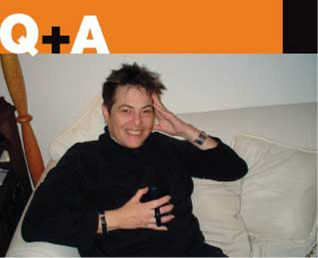
Q&A with Jennifer Abod –
Feminist, Filmmaker, Activist
Reprinted from Curve Magazine September 2007
A veteran in feminist and community radio, a former professor in Intercultural Media Education and Women’s Studies, 60-year-old filmmaker Jennifer Abod’s got a new issue to tackle in her latest project. Look Us in the Eye: The Old Women’s Project, her new documentary, discusses the silenced issues of “old” women, sheds a new light into the injustices of ageism and sexism, and introduces audiences of all ages to the movement’s under-recognized activists.
– Jaime Roca
Did you think of ageism in your 30s, 40s and 50s?
I really didn’t think about it at all.
And what changed as you got “old?”
People start to treat you differently. I was starting to be called “young lady.” … The word “young lady” is supposed to somehow be a compliment. In other words, I look young as opposed as to [being] able to claim my age. I was experiencing sexism in a different way than I did when I was much younger.
Any insights as you made this film?
I was surprised to find out how much I never really thought of old women being a part of all social justice movements. Violence against women for example-I really didn’t consider that old women had their own relationship to this problem. And it is quite large actually because É a lot of old women are raped. Old women are also battered by their spouses and their children, and it’s a significant issue.
What’s different about media and activism in the ’70s versus today?
As far as video goes, there were a number of women who made early films who were associated with universities that were really important in those early years, but a lot of us didn’t have the skills and it was very, very expensive. Now digital media makes things a lot less expensiveÉI think the documentary form is so critically important, especially for lesbians.
What were some of the audience reactions to your film?
The women who are middle aged and old-they are just grateful for bringing the issue up. Because it’s just not talked about, the issues of how old women who are often isolated because young people [don’t] necessarily include old people in their activities. Can you have friends of all ages? Can you see people as peers? As human beings? … I think there is a tendency to not socialize with women who are cross generation, and I think that’s really a problem for social justice movements-that we really need all of our diversity, and that includes across age.